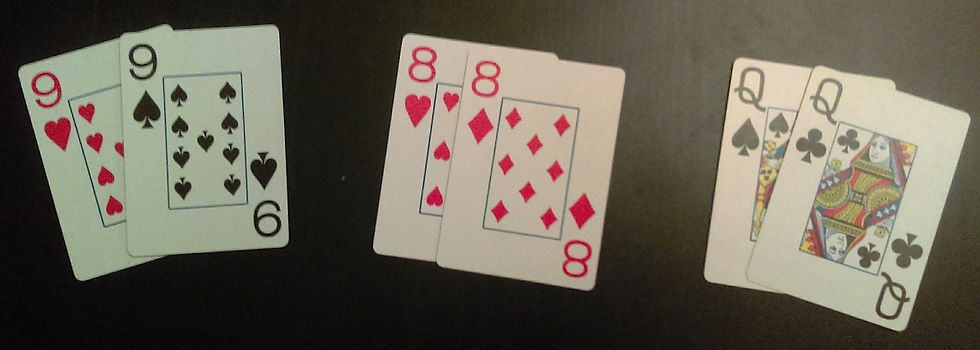Doubles facts with Go Fish
- Matt Felton-Koestler
- Aug 20, 2017
- 4 min read
Parker really enjoyed the make a ten version of Go Fish (we played it several times). But recently P asked to play Go Fish with doubles instead (i.e., to play normally). So I suggested that we have to say what our pair added up to when we played it. Before we started Parker said "I already know 7 and 7 is 14."

Errors
One of Parker's first pairs was eight and eight.
P: 8 and 8 is 15
M: How did you get that?
P: I just said that 7 and 7 was 14, so it's just one more.
M: Why one more?
P: Wait, wait it's 16.
M: How did you get that?
P: It's one more on each one.
Later Parker had two queens, which I said was 12 and 12 (10, jack, queen).
P: It's 22
M: How did you get that?
P: 10 and 10 and 2 and 2. 10 and 10 is 20 and 2 and 2 is 22.
M: I thought 2 and 2 was 4.
P: Oh, yeah, it's 24.
Parker is pretty good at breaking numbers apart, using other facts or prior knowledge to help on a problem, and just generally working with numbers flexibly. But Parker also often makes mistakes like these—usually where there's an extra piece of a number (often the ones) that has not been fully accounted for (like the extra 1 in 8 and 8 and the extra 2 in 12 and 12, even though P verbalized that one).
There's Always Another Strategy
Another one of Parker's pairs was 9 and 9.
P: That's 18.
M: How did you get that?
P: 9 take away 1 and add it to the other 9. That made a 10 and I had 8 left over so I had 18. 10 and 8.
M: I was thinking of another strategy. You just did 10 and 10 is 20, so I thought you might take away 1 for one 9 and 1 for the other 9.
P: But I can't get the answer as easily that way.
M: Yeah, you should definitely use whatever strategy helps you the most. When I share my strategies it's just another way. I don't think it's better than your way, just different. I like all the different ways of thinking about problems.
I love that Parker is willing to stand by strategies that make sense for P while also listening to and thinking about other strategies. This is something I really hope Parker holds on to as P goes through school, where sometimes particular strategies get pushed at the expense of children's ways of understanding.
Questioning
I like to think I'm pretty good at questioning people when they are doing math in that I don't give away the answer with my questions (my students have told me I have a solid poker face). In many classrooms if the teacher asks you a question like "how did you get that" then it's obvious that you made a mistake. Instead, we should question correct and incorrect answers the same way. How did you get that? or Can you explain your thinking? are often the first things out of my mouth. This serves several important functions:
It makes questions normal instead of a negative.
It keeps the math child-centered. If you only ask questions when there's an error then the child knows to look for a mistake. This way they have to explain their thinking regardless.
Explaining your thinking is a hugely important mathematical skill. Sometimes people see these things as peripheral to math. Yeah, maybe they help learn it better (you know it best when you have to explain it), or they're just another nice, friendly way to approach math. But I would argue that they are central to doing mathematics. Explaining, and especially justifying, is a huge part of what mathematicians do. It's also a part of the standards (including in the Common Core). Part of the teacher's job is to help children learn what constitutes a solid mathematical justification through the kinds of questions they ask (where do they push for more detail, for instance).
There are cases where I will directly interject information, such as when I said "I thought 2 and 2 was 4." If I were in a classroom there would likely be someone else with a correct answer and the children could defend their answers and we would likely sort it out through guided discussion. However, one-on-one things work a bit differently. I know that Parker knows what 2 and 2 is (and could justify it with a picture or blocks). So interjecting a small computational piece of information is appropriate, especially if my only alternative is a series of leading questions, which runs counter to my points above about questioning.
It is worth noting that I also sometimes just leave wrong answers alone. We don't have to correct every wrong answer that comes up.
Post a Comment!
Think of some double digit computation problems (say 13 + 13 or 24 + 24). How do you solve this? Do you do the algorithm in your head or something else? How many different ways of thinking about this can you come up with?


Comments